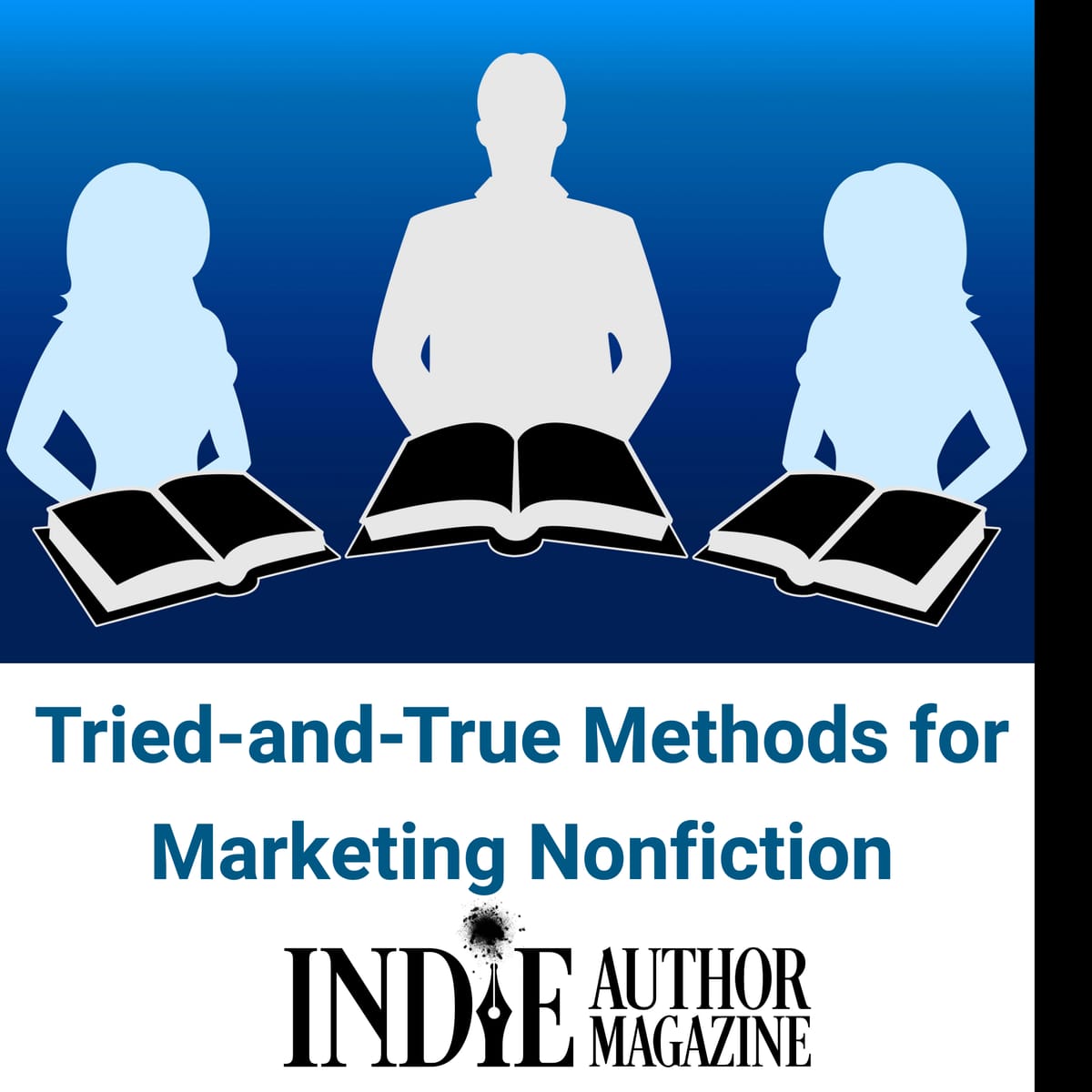Your Own Website
While having an author website is important for fiction authors, it’s equally important, if not more so, for nonfiction authors. A website allows you not only to showcase your book but also to compile articles and blog posts you have written on the topic that demonstrate your expertise. In addition, it’s a place to build your mailing list, link to media coverage of you or your book, and give readers a way to contact you. It also provides a place to share what you are up to and advertise any events where you will be appearing.
Once you have the initial site set up, consider running ads to your website from Facebook or Google. This allows you to increase your visibility and attract people to your website who are looking for you or information on your topic. Many readers of nonfiction like to look up the authors of the book they’ve read to see what other books or articles they may have on the topic.
Writing Articles or Blogs
You are an expert in the topics you have written books about—or, at the very least, you should be. Most likely, you have more content than you have put in your book, or perhaps additional information has become available since you published. These extra prompts and drafts are perfect opportunities for promoting your work and hooking new readers by proving to them your knowledge of the topic.
Authors can sometimes find freelance writing gigs or even work as columnists for newspapers, magazines, or websites. These opportunities give you a chance to get your name and biography listed in publications. In some cases, those biographies can mention the name of your book or that you’re an author, as well as your website, where readers can then find out more about you and your book.
It is important to research publications where you are considering submitting to make sure they are a good match for the topic and the readers you want to attract. If it is a regular publication, consider subscribing and reading current and past articles. Their website may also have submission guidelines or an open submissions policy. You can also use the website Where to Pitch (https://wheretopitch.com) to help find websites and publications that would be a good match for your topic and are open to pitches.
If you can’t find information on submissions with any of these methods, it’s best to reach out to the editor of the publication about whether they would be open to accepting pitches for articles. Contact information for most editors can be found within the publication or on the publication’s website. If they say yes, pitch some ideas, and if they’re accepted, write them and send them their way.
Be sure to ask for and follow their style guides when you write, and listen to their feedback. Afterward, you can ask if they’d be interested in other articles or even an ongoing column.
If you don’t have publications in mind, look at freelance sites and see if you can find someone looking for an article in your area of expertise. Some sites to consider include Upwork, Working In Content, Problogger, Be A Freelance Blogger, and Freelance Writing Gigs, though there are plenty more.
Beyond writing for other publications, publishing blog posts on your own site can draw people to your site and potentially more readers to your book. Although some authors can get away with posting one time a week, it’s best to post three to five times a week. Posting on a regular schedule helps readers know when to expect new blog posts, so they can develop a routine around revisiting your site to read them.
Social Media
Facebook, Twitter, TikTok, and Instagram are great ways to connect with existing readers and new ones. Each platform has its advantages, but the good news is, in many cases, you can reuse content across several platforms. Remember marketing’s “rule of seven”: people have to see content at least seven times before they’ll consider it overused.
Facebook Groups can be a great place to let others know about your book or to share knowledge about the topics you know the most about. There are many groups out there, so be sure to check out the group rules—some don’t allow self-promotion—as well as how active members are. If a group hasn’t seen much activity, it may not be worth your time to post in it. You might also consider creating your own Facebook Group to share knowledge and promote discussion on those topics. You can even invite other authors who write on the same topic to join and contribute as well.
Reaching out to appropriate BookTokkers and Bookstagrammers is another way to promote your book. Many of them will provide video reviews or create promotional images to share your book when they review it. It is important to remember that some of those promoters will want to be paid in addition to receiving a copy of your book, so keep that in mind when you reach out to them.
Don’t forget to use your own social media platforms to promote your books as well. In addition to ads, creating and engaging with your following helps you to spread the word about yourself and your book, and to establish you as an authority figure in your field of expertise. There, you can also share reviews and videos from any influencers with your own followers, increasing your reach—and theirs—even more.
Podcasts
Similar to reaching out to editors about writing articles for them, reaching out to podcasters about a guest appearance is a great way to not only provide them with an interview for their show but also allow you to find new readers who may not have heard from you before.
Chances are you have some podcasters you listen to regularly who might be perfect for you to pitch to about being on their podcast. If you don’t, you may find relevant podcasts on Spotify, Apple, or other platforms. Learn more about the process for becoming a guest on podcasts with IAM's March 2024 feature, “Unlocking the Power of Podcast Appearances for Authors.” Most hosts list contact information on the podcast description page or a website. If they are looking for guests, send them a pitch regarding what you want to talk about on their show.
It is important to note that you should find podcasters who have listeners who would be interested in your topic. It’s also important to consider whether they’re likely to invite guests to speak against your topic, especially if the focus of your book could be controversial. Of course, in these instances, you may want to be on a show to provide your perspective; alternatively, you may want to pass if you are looking to avoid the negativity that could follow such an engagement. Do your research, and consider your options carefully before reaching out to anyone.
Public Events and Media Interviews
In a world focused more and more on technology and connection through online channels, some of the more personal ways to interact with new readers may occur face to face, either through media interviews or in-person events. However, finding places to speak about a topic may require a bit more legwork.
For in-person events and public speaking opportunities, look at professional organizations connected to your subject area, conventions, or conferences that would potentially hold sessions about your expertise to see if they have a call for speakers. If you’re interested in exploring this route, it’s a good idea to have a place on your website where event organizers can see where you’ve spoken before, if you have, and if you’re open to speaking engagements.
Being open to media interviews is another way to promote yourself. Reporters are always looking for interesting local people to talk about. As an author with an interesting or timely book release, they may be interested in interviewing you. It never hurts to reach out to radio, TV, or even local newspapers to see if they’d be interested in a local feature story about you. It can be as simple as sending them press releases about a new release, sending them an email telling them about yourself and your books and letting them know you’d be open to a local interest piece or interview, or asking a local friend to reach out to them to talk about why they think you’d make an interesting feature piece.
Newsletter Swaps
Whether you write fiction or nonfiction, reaching out to other authors who have books on the same or similar topics and asking them to promote your book via a newsletter swap is a great way to reach additional readers. You can organize these using services like StoryOrigin or Bookfunnel, but don’t be shy about reaching out to authors directly either. Sharing each other’s work with a new mailing list can be beneficial to you both. More importantly, you’ll be creating connections within the industry that could provide you with future promotion opportunities down the road.
Other Ideas
As many readers as there are for your book, there are even more ways to reach them. If you are looking for more ideas for how to promote your nonfiction books, check out these additional resources:
- Writer’s Digest, “15 Promotional Ideas for Nonfiction Authors”: https://www.writersdigest.com/write-better-nonfiction/15-promotional-ideas-for-nonfiction-authors
- Reedsy blog, “How to Market a Nonfiction Book: 5 Steps to Selling More Books”: https://blog.reedsy.com/how-to-market-a-nonfiction-book
- BookBub, “16 Creative Ways Authors Promote Nonfiction Books on Instagram”: https://insights.bookbub.com/nonfiction-instagram-book-marketing-ideas
- Elite Authors, “How to Market a Nonfiction Book”: https://eliteauthors.com/blog/how-to-market-a-nonfiction-book


